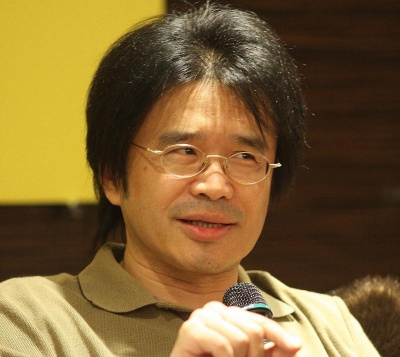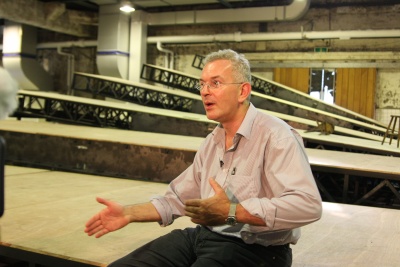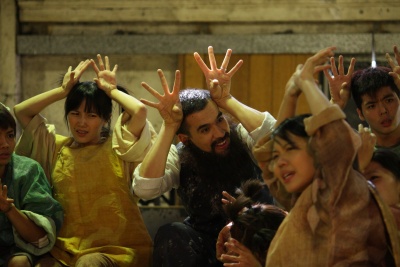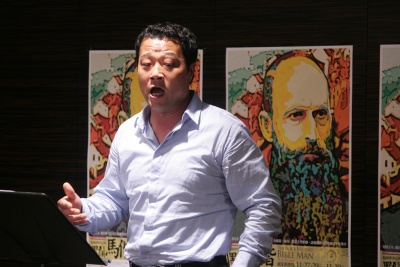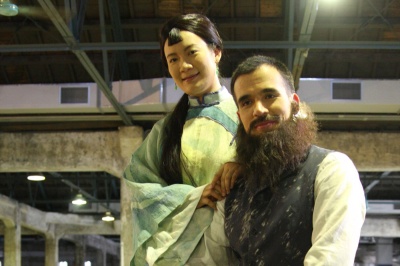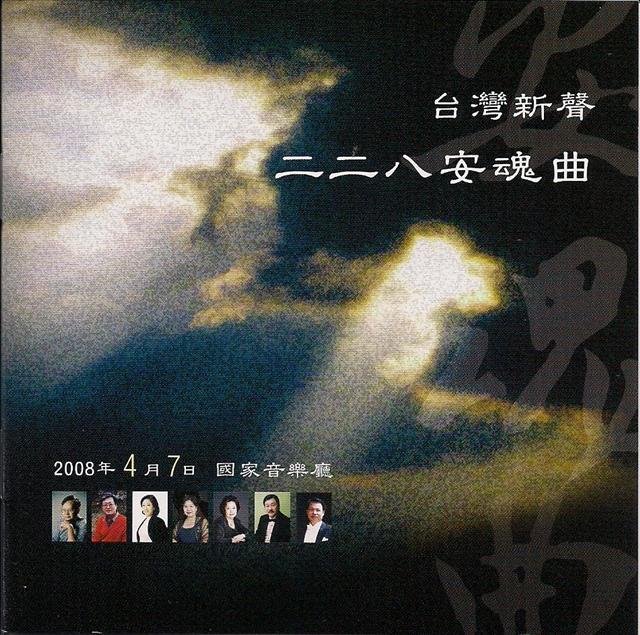
Taiwan New Sound Concert
--Requiem for the 228 Incident
Editor/Felicity Fei-Hsien Chiu (邱斐顯)
Date: 2008 April 7, Monday.
Time: 19:30 p.m.
Venue: National Concert Hall, National Chiang Kai Shek Cultural
Center (國家音樂廳)
The incident that set off the February 1947 uprising occurred in the area near the Tien-Ma Cafe (Tea House) on Nan-Ching West Road in Taipei on the evening of February 27 of 1947 when a policeman attempted to confiscate cigarettes being peddled by an elderly Taiwanese woman. The woman, Lin Chiang Mai, resisted and was then pistol-whipped by the policeman. An angry crowd soon gathered around Lin and the policeman. A warning shot fired by a policeman went astray and killed an onlooker, and that was the spark that lit the so-called 228 Incident.
The 228 Incident of 1947 was a spontaneous uprising by the Taiwanese people against suppression by the Kuomintang (KMT) government which took control in Taiwan in 1945 in the wake of Japanese colonization. Thousands of Taiwanese elites and ordinary citizens were killed in the incident.
The upcoming concert will open with “The Requiem for the 228 Incident,” composed by Ko Fang-Lung(柯芳隆).

Professor Ko, the composer.
The famous poet, Lee Kuei-Hsien(李魁賢)wrote the lyrics for the song, which represents the great spirit of the Taiwanese people in their darkest hour.

Lee Kuei-Hsien, the poet.
Members and the program
Composer: Ko Fang-Lung
Lyricist: Lee Kuei-Shien

Apo Ching-Hsin Hsu, the conductor.
Conductor: Apo Ching-Hsin Hsu 許瀞心
Vocal Soloists: Chen Yun-Yi 陳允宜, Yang Ai-Lin 楊艾琳, Hsueh Ying-Tung 薛映東, Chen Jung-Kui 陳榮貴
Chorus of the Department of Music, National Taiwan Normal University(國立台灣師範大學樂系合唱團), The Philharmonic Symphony which was formed by professors and elite alumni of National Taiwan Normal University(台灣師友愛樂交響樂團), Taipei Century Chorus(台北世紀合唱團), and La Voix d'Azur(蔚藍之聲合唱團)
The program includes Beethoven:Symphony No.3“Eroica”and Ko Fang-Lung:“The Requiem for the 228 Incident”.
A note about Ko Fang-Lung
Ko Fang-Lung was born in Taichung, Taiwan, in 1947. He graduated from the Music Department of National Taiwan Normal University (NTNU)in 1972, and in 1980 entered the Berlin University of the Arts where he majored in composition under Professor F. M. Beyer. He graduated in 1985 and returned to NTNU to teach.
Professor Ko is currently the chairman of NTNU’s Music Department. From 1994 to 1995, he served as president of ISCM. He received the Wu San-Lien Music Award in 2002.
His works combine eastern traditions and western techniques, and reflect his individual characteristics and the influence of his culture. His chamber music composition(Quintet II)received rave reviews when it was performed in Europe and the U.S. His Orchestral piece “Crying Mermaid" is the most frequently performed piece of modern music in Taiwan . The Three Movement Symphony for Chorus and Orchestra, “Dream of Year 2000, " has been performed 10 times since its premiere, each time with about two to three hundred people on stage.
A note about Lee Kuei-Shien
Lee Kuei-Hsien, born in Taipei in 1937, is a famous poet who graduated from Taipei Institute of Technology. He began writing poems in 1953, and by 1976 had become a member of the International Academy of Poets in England . He helped to establish the Taiwan PEN and was elected vice president of the organization in 1987 and president in 1995.
His poems have been translated and published in Canada , Greece , India , Japan , Korea , Mongolia , the Netherlands , New Zealand , Romania , Russia , Spain , the U.S. and Yugoslavia .
His awards include Merit of Asian Poet, Korea (1994); Taiwanese Poet Prize (1997); Poets International, India (1998); Poet of the Millennium Award, International Poets Academy, India (2000); and the Lai Ho Literature Prize and Premier Culture Prize, both in Taiwan (2001). His name was put forward by the International Poets Academy of India three times as a nominee for the Nobel Prize in Literature in 2001, 2003, and 2006. This brought great honor to Taiwan , even though he was just a nominee for the prize.
He also won the Michael Madhusudan Best Poet Award (2000), the Wu San-Lien Prize in Literature (2004) and the Poet Medal from the Mongolian Cultural Foundation (2005).
He has attended international poetry festivals in El Salvador , Japan , Korea , India , Mongolia , Nicaragua and the U.S. He served as Chairman of the National Culture and Arts Foundation from 2005 to 2007.
Lee will give a poetry reading at the upcoming concert.
A note about Apo Ching-Hsin Hsu
Apo Ching-Hsin Hsu, a native of Taiwan , earned a Bachelor of Arts degree in piano studies at National Taiwan Normal University . She did her graduate studies in the U.S. at the Hartt School of Music in Connecticut under the legendary double bassist, Gary Karr. She also earned an MM in double bass and an Artist Diploma in Conducting under Charles Bruck. She attended the Pierre Monteaux Domaine School in Maine for Advanced Conductors, the Conductor's Institute in South Carolina , studying under Harold Farberman, and the Aspen Music Festival in Colorado , studying under Murry Sidlin.
Apo Hsu entered her fifth season as Orchestra Director at National Taiwan Normal University in the fall of 2007. She had previously served as Music Director and Conductor of the Springfield Symphony in Missouri . She also served as Artistic Director of The Women's Philharmonic in San Francisco and earlier as Music Director and Conductor of the Oregon Mozart Players in Eugene , Oregon , after she completed her three-year tenure as Affiliate Artist/NEA Assistant Conductor of the Oregon Symphony.
Apo Hsu has made guest appearances at concerts all over the U.S. , in Russia , Asia, and Australia . Hsu was also invited to guest conduct the Festival Orchestra for the 2003 Summer Presidential Concert in Chungli, and the Presidential Holiday Concert in Tainan , Taiwan in December 2003.
During the University's 60th Anniversary celebrations in May 2006, Apo Hsu led the National Taiwan Normal University Symphony Orchestra on a week long cultural exchange tour of Australia , performing in Brisbane , Sydney and Canberra , Australia . The National Taiwan Normal University Symphony Orchestra and the Festival Chorus also went tour of California tour where they performed “Formosa Dreaming” by Ko Fang-Lung and “Ilha Formosa : Requiem for the Formosan Martyrs” by Hsiao Tyzen. Apo Hsu conducted the Orchestra in September 2007 in three concerts that were presented at UCSD, San Gabriel and San Jose to critical acclaim.
Photo courtesy of the Department of Music, National Taiwan Normal University


